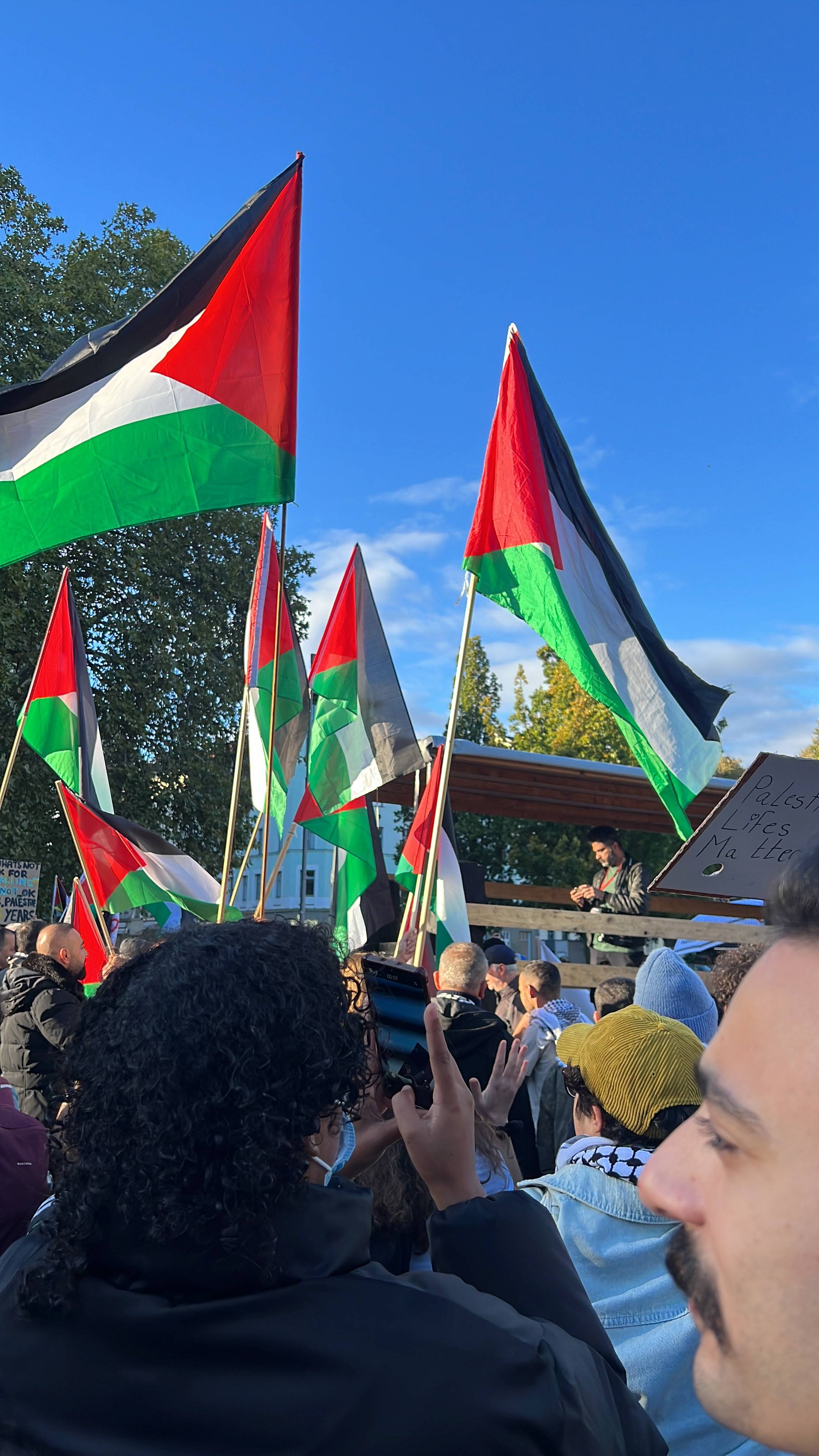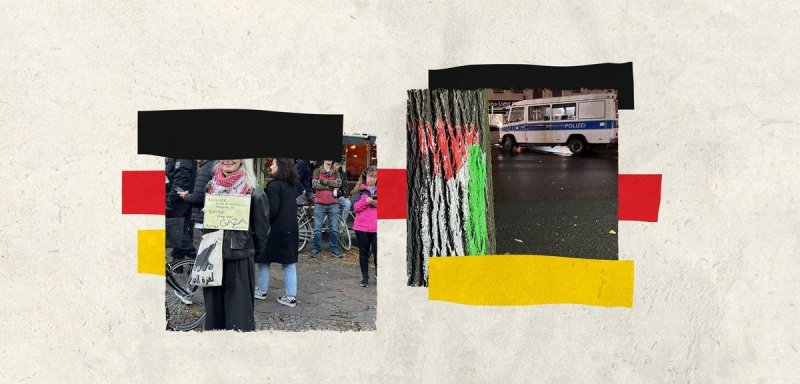German authorities have banned solidarity demonstrations for Palestine as well as any protests against the war on Gaza for two weeks. However, protesters took to the streets from the very first day, raising banners that read "Freedom for Palestine" and waving Palestinian flags. This was especially prominent on Berlin's "Sonnenallee" (Sun Alley), more commonly known as 'Arab Street' (Arabische Strasse) due to its substantial Arab community and a multitude of Arab-owned restaurants and shops. Despite these efforts to protest, the police intervened and prevented these demonstrations.
Some of these demonstrations in Germany have faced accusations by the authorities of being anti-Israel and anti-Semitic, both considered criminal offenses in post-Nazi Germany. As a result, these gatherings were dispersed, and the police demanded identification from individuals carrying Palestinian flags or wearing keffiyehs, accusing them of promoting terrorism.
"We're not even allowed to sympathize with the civilians, men, women, and children being killed in Gaza".. Authorities in Germany are accusing some of the demonstrations of being anti-Israel and anti-Semitic, both considered crimes in post-Nazi Germany
In response to these allegations, Martin Dams, Deputy Head of the Berlin Police Press Office, said in response, "The Berlin police maintains a strong stance against racism and racial profiling and firmly refutes these allegations."
When asked about the situation, Dams elaborated to Raseef22, "Due to prior incidents such as property damage, deliberate arson, violations of Berlin's "Freedom of assembly law", and in order to enforce the existing ban on gatherings, Berlin's police force has been deployed throughout the city. The primary objective is to prevent the recurrence of crimes and administrative violations."
Where do we vent our anger?
On Sonnenallee, Mohammed, a 27-year-old Palestinian hailing from the village of Lubya, criticized the actions of the German police, saying, "Since the commencement of the bombardment on Gaza, we have been deeply concerned about the unfolding events. We closely follow the distressing developments, and we are angry. However, we have been left without an avenue to express our emotions, and all protests have been prohibited in this area. But we still took to the streets because we believe in the right to peaceful protest and assembly. Regrettably, the police met us with a considerable show of force and large numbers, insisting that we disperse. What kind of freedom is this? And what kind of democracy?"
"The police threatening anyone with a flag or a keffiyeh only increases the people's anger about what is happening to their people in Palestine. Where do we vent our anger if we are denied the right to protest?" – Issam, a Palestinian living in Germany
Issam, a 29-year-old originating from the Palestinian village of Hittin, expressed his thoughts, "The extensive police presence and their threats towards anyone holding a flag or wearing a keffiyeh only serve to escalate the anger and frustration of the people, who are already deeply upset and angry about what is happening to their people in Palestine and the constraints placed upon their freedoms. Where do we vent our anger if we are denied the right to protest?"
After two weeks of heightened tensions, authorities eventually sanctioned a demonstration that kicked off in the Kreuzberg area (Oranienplatz) and stretched all the way to Neukölln, on Arab Street. Approximately 5,000 supporters of Palestine showed up, even though the police prohibited the organizers from using loudspeakers due to what they deemed "anti-Israel chants".
Authorities also allowed several pro-Israel demonstrations, including one attended by thousands in the heart of the German capital, near the iconic Brandenburg Gate. Federal President Steinmeier, who was present at this event, called on all citizens to safeguard Jewish life in a speech at the gathering.
Police reported an incident in which two Molotov cocktails were thrown in the direction of a Jewish synagogue in central Berlin, but the Molotov cocktails shattered on the pavement.
Violence on the streets
Following the bombing of the Baptist Hospital in Gaza, Arab Street (Sun Alley) witnessed several nights of angry gatherings. Some of these gatherings saw confrontations erupt between protesters, some of whom used firecrackers and hurled stones at the police. In addition, several garbage containers were set ablaze in the middle of the road, while the police intervened, disbanded the gatherings, and forbade the lighting of candles in memory of the hospital's victims, in addition to arresting several individuals on the street.
"I was born in Germany, but I don't possess German citizenship. They refuse to recognize me as someone with the same rights as others, but I'm required to recognize the entity that occupies my homeland Palestine, which goes against the truth and my principles"
Mohammed, a 47-year-old Egyptian who was present, shared his perspective with Raseef22, "I consider it discriminatory and racist to allow all segments of German society to protest and express their opinions while simultaneously denying those who support Palestine the right to do so. It's also inhumane to witness violent confrontations with protestors at a time when their brothers and sisters in Gaza are being killed."
Iranian activist Hussein, aged 34, stated, "I'm here every day, advocating for freedom of expression and opposing the relentless war spearheaded by Israel against civilians who have no means of defense. It is bombing them from the sky, and depriving them of electricity and water. We are peaceful, and I'm an advocate for non-violence. It's also the responsibility of the German authorities to deal with us peacefully, as there are daily violent arrests on this street."
The German Interior Minister had called for the deportation of individuals who support the Islamic Resistance Movement (Hamas) from the country as soon as possible. She emphasized that she wouldn't tolerate the spread of "hatred and violence" in Berlin, urging citizens to report any propaganda supportive of Hamas, while stressed that German authorities would vigilantly monitor any "potential threats."
German Chancellor Olaf Scholz also announced that his country would ban the activities of Hamas and affiliated organizations, "whose members celebrate the most heinous and violent acts of terrorism," and announced the suspension of aid to the Palestinians.
No rights for us
Omar, 29 years old, was born in Germany but originally hails from the village of Tiberias in Palestine. He says, "I was born in Germany, but I don't possess German citizenship. The state refuses to recognize me as someone with the same rights as others. I am required to acknowledge the entity that occupies my homeland, Palestine, as a state, and to respect it, but this goes against the truth, my principles, and my religion."
Omar pointed out the situation on the German street, stating, "We're not even allowed to sympathize with the civilians, men, women, and children being killed in Gaza."
Mohammed, 20 years old from Safed, also shared, "I was born in Germany, but my parents acquired citizenship before my birth, so I got it automatically. I was never asked if I recognized Israel as a state because I don't. Today, my heart aches for what we see in Gaza, and the least we can do is to protest on the streets and appeal to the German state to help stop this hideous and horrifying war."

On the same street, in another corner, Tarek, 28, and Abdullah, 27, both born in the Ain al-Hilweh refugee camp in Lebanon as Palestinian refugees originally from Tiberias, wore Palestinian keffiyehs and chanted, "Freedom for Palestine". Tarek said, "I arrived in Germany nine years ago, and to this day, I am an unrecognized person in the German state." He produced a document provided to him by the German Immigration Office stating "unrecognized" and continued, "The employee in the immigration office told me, 'We will send you back to your country.' I told her, 'I look forward to that because I've never seen Palestine. Lebanon is not my country; I'm a refugee there just as I am here.' She told me there is no country called Palestine and gave me this paper."
With the documents that Tarek and his friend Abdullah possess, they cannot work, rent a house, or participate in protests today.
"The immigration officer said, 'We'll send you back to your country.' I told her, 'I look forward to that because I've never seen Palestine. Lebanon isn't my country; I'm a refugee there just as I am here.' She told me there is no country called Palestine"
A violation of democratic values
Commenting on the stories of these young people, Qassem al-Masri, an activist from the Palestine Speaks movement, stated, "The German state has already revoked the residence permits of dozens of Palestinian refugees in Germany due to their political stances and attendance in protests in solidarity of Palestine. Even the German media does not deny this fact, and is calling for stricter measures and mass deportations based on these allegations. Right-wing voices that are calling for a strict and discriminatory change in German residency and citizenship laws are rising and growing louder."
"The German state has revoked the residence permits of dozens of Palestinian refugees for attending protests in solidarity of Palestine. Even German media is calling for stricter measures and mass deportations" – An activist from the Palestine Speaks movement
In an interview with Raseef22, he added, "The police's handling of the demonstrations in solidarity with Palestine constitutes an unprecedented legal violation and a serious breach of the democratic values that the German state claims to uphold. However, the audacity accompanying these arbitrary and illegal actions carries a clear racist policy and an exploitation of state power to suspend the rights of the Palestinian minority in Germany."
Regarding accusations of anti-Semitism during these protests, as leveled by German authorities, al-Masri stated, "This accusation is baseless and is a continuous projection of state and institutional racism onto Palestinians, Arabs, and Muslims. More than 96% of anti-Semitic attacks in Germany are carried out by the German right, with the remaining 4% not attributed to Palestinians or Arabs. However, the German state's policy, which has never reckoned with its history of racism and colonialism, strives hard to cast these accusations onto Palestinians."
For years, German authorities have been treating the Palestinian cause as an unjust cause, even to the extent of banning the Nakba commemoration events planned between May 13 and 15 this year. However, Berlin and some other states have begun allowing licensed protests in support of Palestine. One such protest took place on October 28th, which was the largest pro-Palestine demonstration so far in Berlin, with over 10,000 participants chanting for the freedom of Palestine.
Raseef22 is a not for profit entity. Our focus is on quality journalism. Every contribution to the NasRaseef membership goes directly towards journalism production. We stand independent, not accepting corporate sponsorships, sponsored content or political funding.
Support our mission to keep Raseef22 available to all readers by clicking here!
Interested in writing with us? Check our pitch process here!





